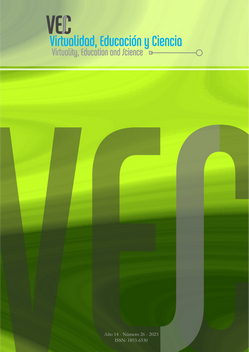Media, childhood and rights: the construction of new strategic political meanings for the exercise of citizenship
DOI:
https://doi.org/10.60020/1853-6530.v14.n26.43747Keywords:
media; childhood; rights; television; communicationAbstract
Thinking about childhood and adolescence today requires taking into account the place they occupy in society, their political and citizen status, their social visibility, their inclusion or exclusion from the public policy agenda and the exercise of their communication rights. This segment of the population does not have instances of social representation, it is not considered a social actor on par with the others, with its ability to contribute to the group that it integrates and to get involved, give its opinion and decide on matters that concern it. For this reason, this article refers to how to make the right to communication effective and, also, how it requires the State to develop equity policies that guarantee the social and cultural recognition of all sensitivities and narratives.
References
ARDÉVOL, E., MUNTAÑOLA, N. (Coord.) (2004). Representación y cultura audiovisual en la sociedad contemporánea. Barcelona: Editorial UOC.
ARIES, P. (1987). El niño y la vida familiar en el Antiguo Régimen. Madrid: Taurus.
BALERIO, D. y PEDERNERA, L. El protagonismo de las infancias y las adolescencias. Recuperado de Bustelo, E. (2007). El recreo de la infancia. Argumentos para otro comienzo. Buenos Aires, Editorial Siglo XXI.
BARATTA, A. (1999). Infancia y democracia. En derecho a tener derecho. Infancia, derecho y políticas sociales en América Latina, t. 4. Montevideo: UNICEF, pp. 207-236.
BARBERO, J. M. (2001). Claves de debate/ televisión pública, televisión cultural: entre la renovación y la invención. Bogotá: Fes-Prometeo.
BENEDICTO, J. (2003). Infancia y juventud: nuevos sujetos de ciudadanía. Un reto para la sociología de la infancia. En Red por los Derechos de la Infancia. En línea http://www.derechosinfancia.org.mx/Temas/temas_sociologia2.htm (01/08/2013)
BUSTELO, E. (2007). El recreo de la infancia. Argumentos para otro comienzo. Buenos Aires: Siglo XXI.
CARLI, S. (1999). De la familia a la escuela: infancia, socialización y subjetividad. Buenos Aires: Santillana.
CARLI, S. (2009). La cuestión de la infancia en América Latina: tiempo pasado, tiempo presente. Los dilemas de la educación contemporánea. Conferencia presentada en: Coloquio Infancia. Bogotá: Universidad Distrital Francisco José de Caldas
COREA, C., LEWKOWICZ, I. (1999). ¿Se acabó la infancia? Ensayo sobre la destitución de la niñez. Buenos Aires: Lumen Humanitas.
DI PALMA, C (2020). La pantalla no es un juego. Revista Kine. En línea https://www.revistakine.com.ar/la-pantalla-no-es-un-juego/ (1/10/2022).
GAITÁN MUÑOZ, L. (2006). La nueva sociología de la infancia. Aportaciones de una mirada distinta. En Política y Sociedad, vol. 43 (1), pp. 9-26.
GÖTZ, M. y LEMISH, D. (2012). Sexy Girls, Heroes and Funny Losers. Gender Representations in Children’s TV around the World. Frankfurt: Peter Lang.
MEIRIEU, P. (2010). Una llamada de atención. Barcelona: Planeta.
MULEIRO, H. (2013). Por una comunicación democrática de la niñez y la adolescencia. Buenos Aires: UNICEF, AFSCA, Defensoría del Público.
RAMOS, P. y TORRES, A. (comp.) (2008). El audiovisual y la niñez. La Habana: ICAI.
UNICEF (2020). Encuesta de percepción y actitudes de la población. Impacto de la pandemia y las medidas adoptadas por el gobierno sobre la vida cotidiana de niñas, niños y adolescentes. Buenos Aires: UNICEF. En línea https://www.unicef.org/argentina/media/8056/file/Covid19-EncuestaRapida-InformeEducacion.pdf (1/10/2022).
Downloads
Published
Issue
Section
License

This work is licensed under a Creative Commons Attribution-NonCommercial 4.0 International License.
The generation of derivative works is allowed as long as it is not done for commercial purposes. The original work may not be used for commercial purposes.


